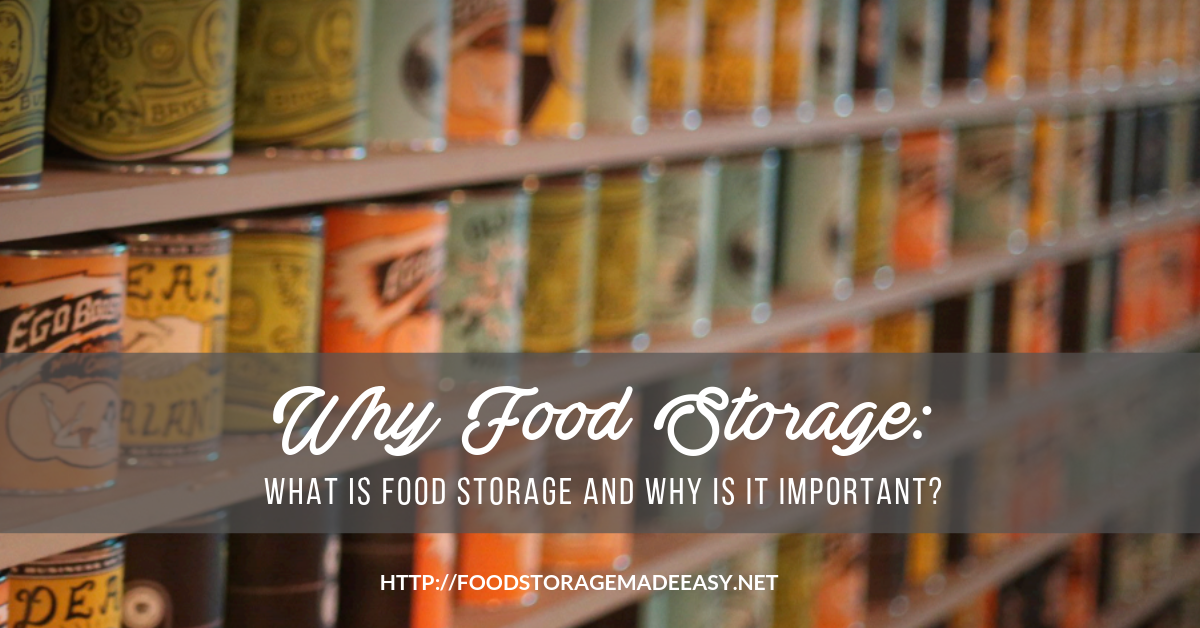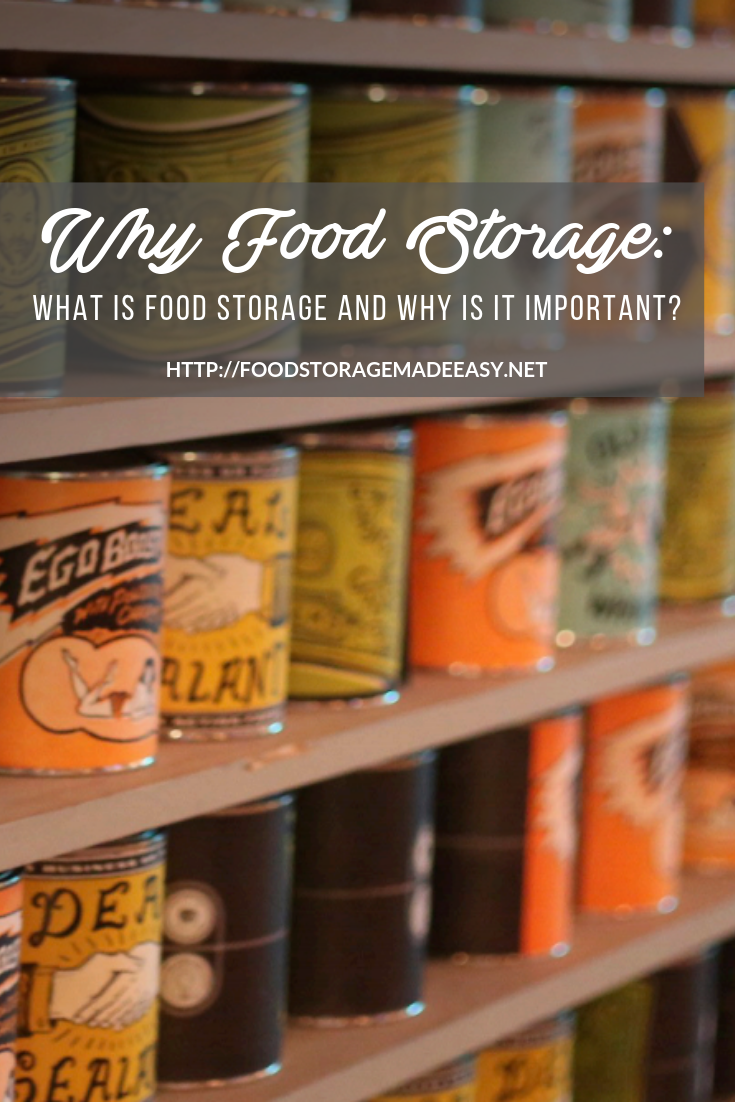
Many people stumble across the idea of building a food storage by watching shows like Doomsday Preppers or even The Walking Dead. Outside of preparing for a zombie apocalypse there are MANY reasons why people may choose to build a food storage. Before we dive into that let’s cover WHAT food storage is first.
What is Food Storage?
Food Storage is the concept of “storing” food for a number of “what if” situations. While having a basic emergency preparedness plan in place for evacuation situations is important, it doesn’t really include storing a lot of food beyond a few days worth. The main governing food storage principles that we teach here at Food Storage Made Easy are as follows:
WATER STORAGE:
Store drinking water for circumstances in which the water supply may be polluted or disrupted. Try to have at least a 14 day supply on hand plus a good filter to treat additional water when that runs out.
THREE-MONTH SUPPLY:
Build a small supply of food that is part of your normal, daily diet. Gradually increase your supply until it is sufficient for three months. These items should be rotated regularly to avoid spoilage. We consider foods stored in a freezer to count for your 3 month food supply.
LONG TERM FOOD STORAGE:
For longer-term needs, and where permitted, gradually build a supply of food that will last a long time and that you can use to stay alive, such as wheat, white rice, and beans. These items can last 30 years or more when properly packaged and stored in a cool, dry place. A portion of these items may be rotated in your three-month supply.
Why Food Storage?
The topic of food storage can be very foreign to those who aren’t familiar with it. Today we wanted to cover the five main reasons why WE feel it is important to have a stockpile of food. We’d love to hear why YOU think it’s important to build a food storage. We encourage you to join the discussion in our Facebook Group via the link below:
1. NATURAL DISASTERS
Natural disasters tend to be the main reason that people decide to start getting into food storage and emergency preparedness. For us, it wasn’t any different. After “growing up” and having kids we started realizing we were in charge of our families now. If some crisis were to happen, we would have had no idea how to deal with it and we were definitely not prepared.
We would ask ourselves, “If an earthquake hit and we had no power or water for days or weeks, would we have the supplies we needed on hand?” The list of potential “Disasters” is LONG! Here are just a few that we have come up with:
Natural Hazards: Floods, Tornadoes, Hurricanes, Thunderstorms and Lightning, Winter Storms, Extreme Cold, Extreme Heat, Earthquakes, Volcanoes, Landslides and Debris Flow (Mudslide), Tsunamis, Fires, Wildfires.
Technological Hazards: Hazardous Materials Incidents, Household Chemical Emergencies, Nuclear Power Plants.
Terrorism: Explosions, Biological Threats, Chemical Threats, Nuclear Blast, Radiological Dispersion Device (RDD), Homeland Security Advisory System.
If all of these reasons sound a little bit terrifying to you, just take a deep breath and have faith in the process. We really believe in the saying “If you are prepared, you will not fear”, because with each BabyStep we took in our journey, the better we felt and you can have that too.
2. ECONOMIC CRISIS
While Natural Disasters are the main reason most people START building a food storage, the idea of an economic crisis is what KEEPS people building their food storage. The likelihood of money being tight is MUCH higher than a power or water outage type disaster. Money being tight could come as a national, local, or personal emergency. You never know what could happen and it’s such a blessing to have food stored and a plan in place for a time when you might have to live off of what you have stored.
A bonus for the economic reason is that food storage can actually end up SAVING you money in the long wrong. Cooking more from scratch, always shopping when things are on sale, avoiding waste by not buying as much fresh produce are just a few of the ways food storage can benefit your pocketbook as well.
3. HEALTH BENEFITS
Living a “food storage diet” is much healthier than the fast/convenient food diets that so many people eat these days. While some food that is often stored may not be the healthiest (white sugar) there are always alternatives that will work for you (honey). Here are just a few of the many health benefits of food storage:
Whole Grains:
Storing grains such as wheat is one of the most effective ways of getting whole grains in your diet. You can use a wheat grinder to make whole wheat flour used to make pizza, pancakes, bread, etc. When wheat is processed into refined white flour, the following nutrients are lost: 50% of the beneficial unsaturated fatty acids, almost all the vitamin E, 50% of the calcium, 70% of the phosphorus, 80% of the iron, ninety 80% of the magnesium, 50-80% percent of the B vitamins. Kind of makes you want to ALWAYS grind your own flour doesn’t it?
Legumes:
Legumes are one of the most versatile foods you can store. You can sprout legumes to provide healthy vegetable options which enhances their already high nutritional value. Health benefits of beans include: low calorie food that can be used to make creams and soups, excellent source of protein, forms a complete protein when combined with grains, 1 cup of beans provide the same amount of fiber as 3 doses of Metamucil, nearly all beans have only 2-3% fat, beans can help lower your cholesterol level.
Baking Ingredients:
The beauty of these long term food storage items is portion control! When you buy baked goods or processed foods you have no way of controlling how much sugar, preservatives, or salt go in your foods. When you make foods from scratch you can control amounts.
Allergies/Dietary Restrictions:
If you or a family member has food allergies or other dietary restrictions, food storage is even more important for you. You have complete control over what goes into your cooking. By making it from scratch you are saving lots of money over buying specialized foods from the grocery store.
4. EVERYDAY EMERGENCY
While you would never think of STARTING to do food storage to prepare for “everyday emergencies”, it sure is a nice side benefit once you have some food storage accumulated. Here are a few every emergencies that we have found food storage to help with immensely:
- Running out of ingredients in a recipe
- Needing a quick dinner when you’re short on time
- Last minute “food assignment” for a party or event
- Don’t have time to shop
- Convenience, saves time on chopping and thawing
- Food safety, no salmonella risk in powdered eggs
5. RELIGIOUS REGIONS
If you start researching “Food Storage”, you will most likely discover that it is a very common practice among members of different religions. Even in biblical times, people were counseled to be prepared. Think of the story of Joseph of Egypt who, through preparedness, was able to withstand 7 years of famine. Leaders of different faiths have long counseled members to be prepared for uncertainties.
Not only do some religions counsel their members to be prepared, but they also encourage self-reliance. Through self-reliance you gain great strength of character, and are in a better position to be charitable and help others. It’s always comforting to know that you don’t have to count on outside sources to feed, clothe, or shelter your family.
Whatever YOUR personal reasons are for starting your food storage journey, you will probably find many more reasons to do it as you continue on the path to preparedness.
Pin this post to save it for later


-Jodi Weiss Schroeder
http://foodstoragemadeeasy.net


